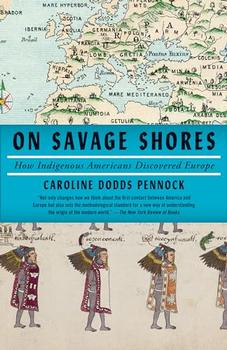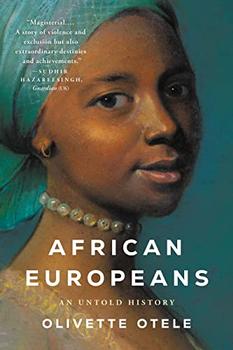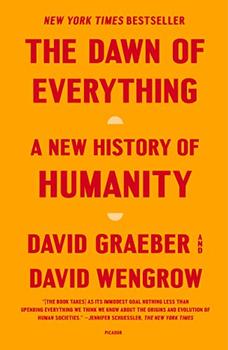Summary | Excerpt | Reviews | Beyond the book | Read-Alikes | Genres & Themes | Author Bio

How Indigenous Americans Discovered Europe
by Caroline Dodds PennockA landmark work of narrative history that shatters our previous Eurocentric understanding of the Age of Discovery by telling the story of the Indigenous Americans who journeyed across the Atlantic to Europe after 1492
We have long been taught to presume that modern global history began when the "Old World" encountered the "New", when Christopher Columbus "discovered" America in 1492. But, as Caroline Dodds Pennock conclusively shows in this groundbreaking book, for tens of thousands of Aztecs, Maya, Totonacs, Inuit and others —enslaved people, diplomats, explorers, servants, traders—the reverse was true: they discovered Europe. For them, Europe comprised savage shores, a land of riches and marvels, yet perplexing for its brutal disparities of wealth and quality of life, and its baffling beliefs.
The story of these Indigenous Americans abroad is a story of abduction, loss, cultural appropriation, and, as they saw it, of apocalypse—a story that has largely been absent from our collective imagination of the times. From the Brazilian king who met Henry VIII to the Aztecs who mocked up human sacrifice at the court of Charles V; from the Inuk baby who was put on show in a London pub to the mestizo children of Spaniards who returned "home" with their fathers; from the Inuit who harpooned ducks on the Avon river to the many servants employed by Europeans of every rank: here are a people who were rendered exotic, demeaned, and marginalized, but whose worldviews and cultures had a profound impact on European civilization.
Drawing on their surviving literature and poetry and subtly layering European eyewitness accounts against the grain, Pennock gives us a sweeping account of the Indigenous American presence in, and impact on, early modern Europe.
The "savage shore" Pennock writes about is Europe, as experienced by various Indigenous travelers. This upends and reframes popular conceptions of the word "savage" and who or what the appellation is often applied to. Along with the travels of Indigenous people, Pennock also exhaustively details the "stuff of life" that traveled from the Americas back to Europe, influencing its culture and pastimes. The relative lack of first-person Indigenous accounts in the book — both current and historical — is a limitation that results in a narrative frequently peppered with the author's own questions about what Native travelers might have seen, felt or thought about their interactions. The reader is invited to wonder, to imagine, but not necessarily to know what the experience of Indigenous people at this time was truly like...continued
Full Review
 (877 words)
(877 words)
(Reviewed by Peggy Kurkowski).
 One of the more flavorful influences of the New World on the Old in the age of Christopher Columbus was the impact Indigenous Americans had on the food of Europe. This occurred as part of what is popularly known as the "Columbian Exchange," or the general mixing of goods and culture (as well as disease) between Indigenous peoples in the Americas and Europeans, and it changed the world forever.
One of the more flavorful influences of the New World on the Old in the age of Christopher Columbus was the impact Indigenous Americans had on the food of Europe. This occurred as part of what is popularly known as the "Columbian Exchange," or the general mixing of goods and culture (as well as disease) between Indigenous peoples in the Americas and Europeans, and it changed the world forever.
Caroline Dodds Pennock notes in her book On Savage Shores that "before contact with the Americas, Europe (and indeed the rest of the world) had no potatoes, squash, maize, or beans." The flow of crops and cuisine from the west (the Americas) to the east (Europe and beyond) occurred rapidly. Maize (corn) and potatoes in particular took root (no...

If you liked On Savage Shores, try these:

by Olivette Otele
Published 2023
A dazzling history of Africans in Europe, revealing their unacknowledged role in shaping the continent.

by David Graeber, David Wengrow
Published 2023
A dramatically new understanding of human history, challenging our most fundamental assumptions about social evolution―from the development of agriculture and cities to the origins of the state, democracy, and inequality―and revealing new possibilities for human emancipation.